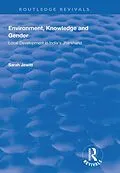This title was first published in 2002: Tracing global shifts in development thinking through to national-level policy making in India and its local-scale implications, Sarah Jewitt investigates the practical value of radical populist and eco-feminist alternatives to more mainstream forms of development. Using detailed empirical data on forests and agriculture from two adivasi (tribal) villages in India, she takes a micro-political ecology approach to examine inter- and intra-community (especially gender) variations in environmental knowledge, resource management strategies and development aspirations. Critiquing the adoption of romanticized eco-feminist discourse in policymaking, Jewitt studies the Jharkhand region of Bihar, India, to determine women's contribution to environmental degradation and how the implementation of environmentally-oriented development initiatives affects their daily lives. She also examines the populist concern about the displacement of traditional agro-ecological practices by modern techniques, and illustrates the need to understand local people's socio-cultural beliefs and aspirations as well as their technical knowledge when seeking to promote more appropriate development.
Autorentext
Sarah Jewitt, School of Geography, The University of Nottingham, UK
Inhalt
Introduction; Changing ideologies in development thinking: the shift to a more appropriate approach; The adoption of gender issues into development and environmental policy making; Environmental management and forest policy in India; Gender and environmentally-oriented development in India; Introduction to Jharkhand and fieldwork methodologies; Introduction to the fieldwork villages; Technical and socio-cultural systems of agro-ecological knowledge in Jharkhand; Gender and agriculture in the research area; Forest use and management in the research area; Autonomous and joint forest management in Jharkhand; Gender, silvicultural knowledge and forest management; Conclusions; Bibliography; Appendices.
